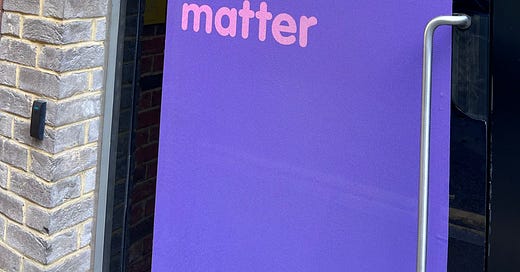For the last 3 years, I spend 4 days every August up in London; part research, part respite, it’s a time to take stock, plan for the future, as well as to explore a more typically ‘arts’ universe I wouldn’t get to check in on otherwise.
over at is very outspoken about the need for awe1 - which is why I have started a practice of building this back into my work.While away, I interviewed a lawyer - more on that in the book one day - who made an interesting point. Their point stuck in my mind, enough so I was still thinking about it on the return journey home.
Having responded to an inquiry about the institutionalisation of Racism in the UK, he noted that the lived experienced of to be a victim of racism had been taken as fact, and was not disputed at all by the inquiry; the question therefore, he wondered, shouldn’t the same standard be set for Disabled individuals in the UK? This articulated something I had struggled to describe for a long time.
Ableism is an interesting concept; to me, it is the one thing that I am almost never believed on when I speak to the harm it causes. “Oh, but he’s just being helpful!” “Not everyone is out to disrespect you!” And then cue the cutesy shock and amazement when, say, there’s a documentary that actually documents the abuses enabled and put up with. The cognitive dissonance is beyond astounding.2
We also forget internalised ableism, as well as the basic microaggressions that litter the every day. (See also: “But can’t you just try… walking without your cane?” “Can’t you just try harder?” This piece should explain more as to what a microaggresison is.) Disabled people can also be ableist towards another person belonging to the same demographic too.
I wanted to collect the most amount of examples in one week, just to illustrate how pervasive is the practice, how harmful it can be. Sexist practices can also be disability specific, and disabled women are at statistical greater risk, too.
at wrote a brilliant book about this - and I want to see more discussion on this, too.Keep reading with a 7-day free trial
Subscribe to The Disabled Feminist to keep reading this post and get 7 days of free access to the full post archives.




